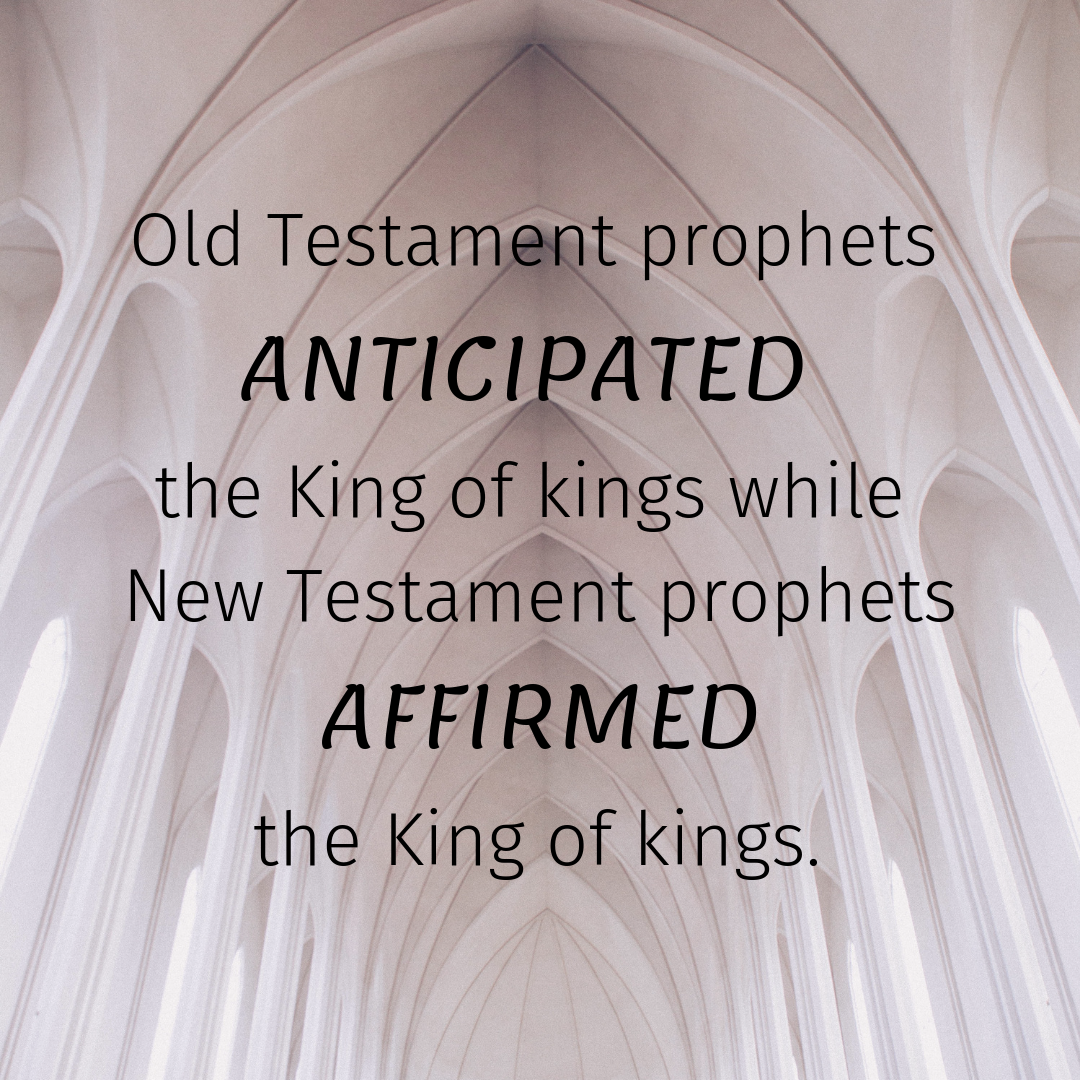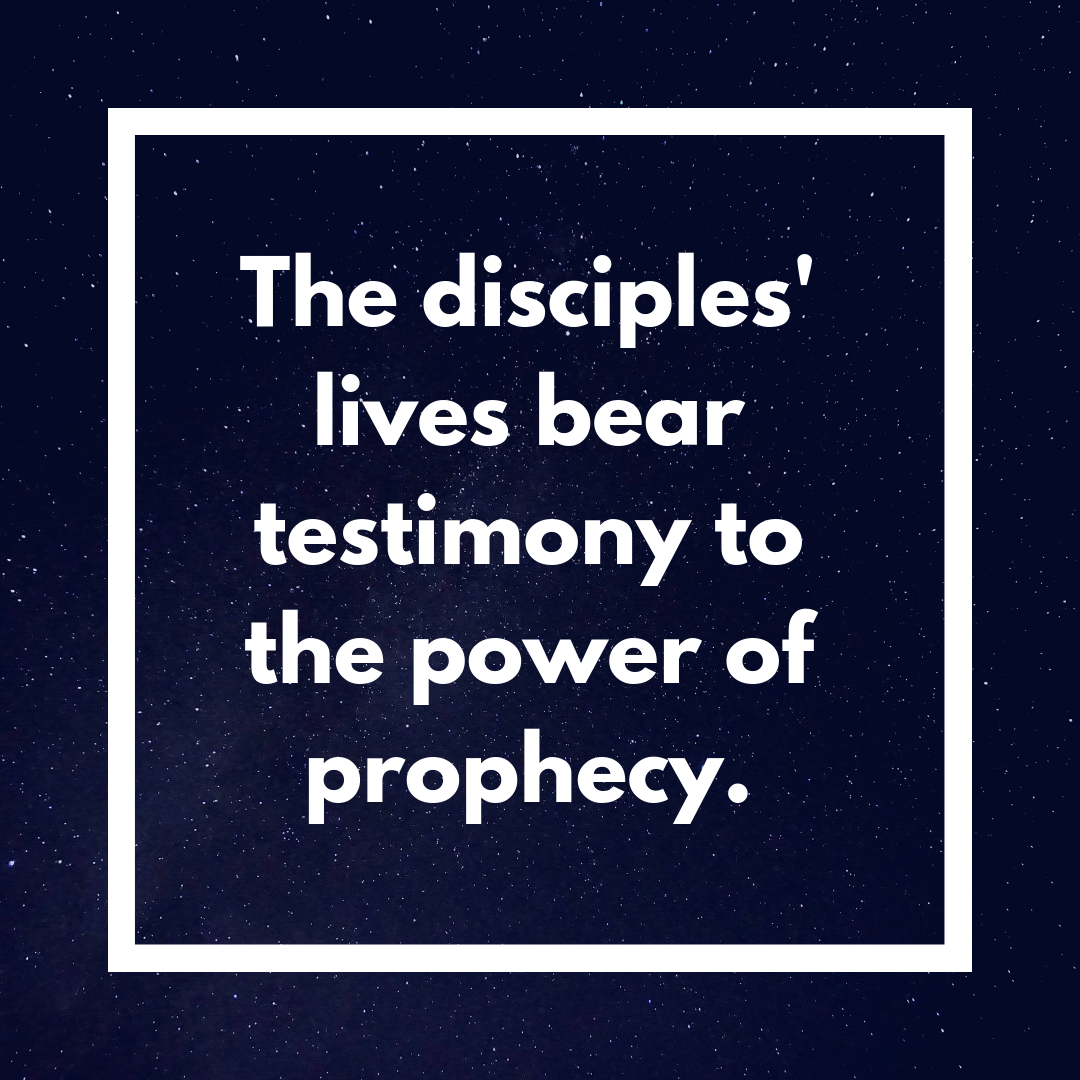Prophecy fascinates us because it points to something beyond our physical world and reminds us of God’s hand at work in creation. Ecclesiastes 3:11 says that God has “set eternity in the human heart” (NIV). We yearn to discover eternity because we were created for it (John 3:16). Everything that can be known about the future is revealed through Old and New Testament prophecy.
Jesus warned that false prophets would be prevalent during earth’s final days (Matthew 24:11). In 1997, Michael Drosnin published The Bible Code, which described a hidden message he claimed to have found in the Pentateuch (the first five books of the Bible). According to Drosnin, this message predicted a comet would annihilate all life in 2012. In the same year, the ancient Mayan calendar inspired some to believe the world would end near 2012’s winter solstice. Well, the fact that we are still here proves the inaccuracy of these—and many other—extrabiblical prophecies. By studying Scripture, we can avoid the deception of such imposters.

Marks of Prophecy
There are three hallmarks that define Old Testament prophecy: authenticity, absolute specificity, and accuracy.
Authenticity of Prophecy
For prophecy to be authentic, the prophet must not exert any influence upon the event that he is prophesying. He cannot be able to manipulate the circumstances so that the event will come true. When a teacher announces to her class there will be a test tomorrow, she is not prophesying. She is stating a fact based on her authority to issue a test at a future time. Prophecy must be given in advance of its fulfillment and by someone who does not have control over the prophesied events.
Absolute Specificity of Prophecy
Biblical prophecy must be specific. God’s prophecies are usually very detailed, eliminating any chance of coincidence. In Micah 5:2, the prophet predicted the Messiah would be born in Bethlehem Ephrathah in Judah. At the time of Christ, there was at least one other town named Bethlehem, but Micah accurately and specifically anticipated the Messiah’s arrival in Bethlehem Ephrathah seven hundred years beforehand.
Accuracy of Prophecy
Any prophet who claims to have a word from God must be one hundred percent accurate. God describes this measurement of prophecy in Deuteronomy 18:20-22. He concludes, “When a prophet speaks in the name of the Lord, if the thing does not happen or come to pass, that is the thing which the Lord has not spoken; the prophet has spoken it presumptuously; you shall not be afraid of him.” If someone speaks a prophecy that does not come to pass, the Lord says you can know for sure that his message is not from Him. By the authority of Almighty God, we know that anyone claiming to be His prophet must be spot on.
Old Testament Prophecy
Circumstances
The true sense of a prophet is being one who proclaims truth on behalf of another. Within that framework, the ways God revealed truth to Old Testament prophets varied. They received information from God through dreams, visions, angels, and verbal communication. The method does not matter nearly as much as the message. Whenever Israel’s king began to fail, God provided prophets to correct him. After Israel and Judah were conquered and there was no longer an earthly king, God provided prophets to guide the exiles. God spoke to His ancient prophets in a variety of ways; regardless of the method, the prophets were responsible to faithfully communicate His message to the people.
Prophetic Limitations
While the prophets held the distinction of being hand-selected messengers from God, they were still confined by their human perspective. As they peered into the future, events often converged for them because they didn’t understand the timeline of their prophecies. When we watch the sun set, it appears to melt into the earth. Now, we know the two do not touch, but from our limited vantage point, it appears as if they do. When the prophets received a vision, they didn’t realize the events in their visions were sometimes separated by vast spans of time. For instance, the coming of the Messiah and the Day of the Lord were often seen in succession. These prophecies were event oriented, not time oriented. God gave the prophets supernatural revelation, but He didn’t explain all the specifics to them.
How Does Old Testament Prophecy Relate to New Testament Prophecy?
The fundamental role of a prophet did not change from the Old Testament to the New Testament. Prophets continued to be God’s spokesmen. They communicated His plans, purposes, and power. Before Israel and Judah’s exile, prophets addressed the king’s failures and called him to repentance. During the exile, prophets pointed to a future King who would ransom His people and rule in perfect holiness. In the New Testament, prophets illustrated Christ’s kingship through the events of His life and prophesied His triumphant return. Old Testament prophets anticipated the King of kings while New Testament prophets affirmed the King of kings.

Awaiting the Messiah
There are over three hundred specific promises about the coming Savior in the Old Testament. In Acts 3:24, Peter stated, “All the prophets, from Samuel and those who follow, as many as have spoken, have also foretold these days.” Here are just a few of the messianic prophecies Jesus fulfilled.
- Micah predicted Jesus’s birth in Bethlehem Ephrathah (Micah 5:2).
- Zechariah foreshadowed a future when the Davidic monarch and the priesthood would meet in the Messiah (Zechariah 6:11-15; Hebrews 3:1; Revelation 5:5).
- Jeremiah foretold the slaughter of the innocents that was carried out by Herod (Jeremiah 31:15).
- Hosea revealed that Mary and Joseph would have to flee to Egypt to save Jesus’s life (Hosea 11:1).
All these prophecies occurred more than four hundred years before Jesus was born in Bethlehem!
Prophecy has always pointed to Almighty God’s magnificent plan of redemption through Jesus Christ our Lord.
New Testament Prophecy
Who Are the New Testament Prophets?
There are several prophets named in the New Testament. Of those, John the Baptist, John the apostle, and Jesus Christ are the most prominent.
John the Baptist: The One Who Prepares the Way
John the Baptist fulfilled the prophecies of Isaiah 40:3 and Malachi 3:1 by preparing the way for Israel’s Messiah. In the ancient world, road conditions were unpredictable, particularly outside of Rome. When a king conquered new territory, he would dispatch people to prepare a smooth roadway through the unfamiliar land so that the king could survey his spoils. This was the essence of John the Baptist’s ministry: he was the one sent ahead, into the wilderness, to prepare a path for the Messiah by calling God’s people to repentance and urging them to prepare their hearts.
Total Devotion
In the tradition of Elijah, this unusual man was totally devoted to his ministry. John the Baptist was one of only three life-long Nazarites identified in the Bible. (Samson and Samuel are the other two.) This means he was consecrated, or set apart, by his parents before birth to serve the Lord and to uphold specific requirements of the Nazarite vow. During John’s ministry, people flocked to the desert to hear his preaching and to receive his baptism. At one point, a dispute arose between John’s disciples and some Jews, but John was never distracted from his mission. He kept an eternal perspective and yielded to Jesus’s ministry:
John understood his role and maintained his priorities. He was just as comfortable being the voice in the wilderness as he was baptizing thousands in the desert because the only thing that mattered to him was to be God’s person, in God’s place, doing God’s will, at God’s time.

The Greatest Prophet
Jesus described John the Baptist as “more than a prophet” and went on to say, “there is not a greater prophet than John the Baptist” (Luke 7:26, 28). In every sense of the word, John the Baptist fulfilled his calling . . . even though he performed no miracles and was martyred (John 10:41; Mark 6:27-28). He paved the way for the Savior, and he modeled discipleship for the Savior’s followers. John’s passion, preaching, and prophecy persuaded many to follow God (Luke 7:29).
John the Baptist’s legacy leaves no room for arrogance or apathy. Dietrich Bonhoeffer has said, “When Christ calls a man, he bids him come and die.”1 John the Baptist was born as a forerunner who prepared the way for the Messiah. He was respected as a prophet who earned the people’s trust (Matthew 14:5). He died as a martyr who proclaimed God’s Truth.
John: The Disciple Jesus Loved
The apostle John held a distinct advantage as he penned his Gospel and prophesied Jesus’s return, for he was one of the Lord’s closest friends. John was present with Jesus at some of the most critical moments in His ministry, and Jesus entrusted him with the care of His mother, Mary (John 19:27). Throughout his Gospel, John modestly refers to himself as “the disciple whom Jesus loved,” waiting until the next-to-last verse to reveal that he was that disciple (21:24). John’s only notable fault seems to be his overly ambitious zeal for the Lord (Mark 10:35-41; Luke 9:54-56). While John the Baptist supported Jesus’s ministry from afar, John the apostle was the Lord’s constant companion and devoted disciple.
John's Gospel
John’s written works portray the same zealous passion for God’s kingdom that characterized his daily life. In every regard, the Gospel of John reveals Jesus as the authentic way to life, both in heaven and on earth. John recorded seven major miracles of Christ, each focusing on a different dimension of Christ’s deity. His Gospel emphasizes Jesus’s fulfillment of prophecy and concludes with, “But these are written that you may believe that Jesus is the Christ, the Son of God, and that believing you may have life in His name” (John 20:31).
John's Letters
In his later years, John penned three epistles, or letters, and the mysterious prophecy of Revelation while in exile on the lonely isle of Patmos. These works provide unique insight from the longest living disciple—from one who had opportunity to help found Christ’s Church and then evaluate its progress. Full of fervor, his letters admonish readers to hold fast to the Truth and to stick to the basics. John spoke against false teachers who created divisions in the Church while encouraging his readers toward the same type of intimate, day-by-day, moment-by-moment spiritual walk with Jesus that he had enjoyed.
John's Prophecy
At some point during John’s exile, the risen, glorified Jesus Christ appeared to His beloved disciple in all His glory, prompting John to write Revelation. This book carried specific messages of encouragement and warning for the churches in Asia, but the letters were also intended to inform the Church of today. After addressing the Asian churches, John describes visions of warfare, judgment, and ultimate victory for Christ the Lamb and King. These visions are difficult to understand; they require having “ears to hear” (Revelation 2:7, 11, 17, 29; 3:6, 13, 22), but God promises a special blessing for those who peer into the future with John (1:3).
Lining up John’s various writings reveals a continuum of faith. His Gospel calls us to obey Jesus, trusting in His promises and deity. His letters call us to walk daily with the Lord, clinging to the Truth. His Revelation calls us to endure for the Lord and to anticipate ultimate victory. In everything John wrote, his goal was to portray Christ as the divine Son of God, clothed in human flesh, having come to save all who believe in Him (John 1:14; 3:16; 20:30-31).

Jesus Christ: Prophet, Priest, and King
It may seem strange to classify the Son of God as a prophet, but the Bible supports this treatment. In the words of Deuteronomy 18:18, “I will raise up for them a Prophet like you from among their brethren, and will put My words in His mouth, and He shall speak to them all that I command Him.” On two different occasions, the disciples quoted this verse and explained Christ’s fulfillment of it (Acts 3:22; 7:37).
When we consider the purposes and marks of a prophet, Jesus fulfilled all of them. In John 1:1, He was called “the Word.” Later, He stated that He did not speak His own words but those of the Father (John 7:16; 8:28; 17:6-8). As the Word, Jesus brought glory to God by calling people to repentance and obedience. Finally, He specifically and accurately prophesied about future events, including End Times (Matthew 16:21; 26:34; 24—25; 27—28; Acts 1:8).
Jesus's Healing and Miracles
During His earthly ministry, Jesus performed the greatest cluster of healing and miracles witnessed by mankind. Several of these are recorded in Scripture, but John tells us, “Truly Jesus did many other signs in the presence of His disciples, which are not written in this book; but these are written that you may believe that Jesus is the Christ, the Son of God, and that believing you may have life in His name” (John 20:30-31). These miracles attested to the arrival of the kingdom of God, proved Jesus’s deity, and imparted confidence to those who believed His claims.
Glorifying the Father
As a prophet, Jesus demonstrated His anointing through miracles, healing, and teaching. But His purpose was not to bring glory to Himself; His purpose was to glorify the Father (John 14:13). Just as John the Baptist knew he must decrease so that Jesus may increase, Jesus knew His adoring crowds must ultimately yield to an agonizing crown. His glory had to decrease so that the Father’s glory might increase. Jesus knew His miracles would incite the hatred of powerful Jews. He performed them despite the publicity they would create, not because of it. Jesus came to be the Suffering Servant, prophesied by Isaiah, who would bear our griefs and carry our sorrows (chapter 53). So, in the tradition of the prophets, Jesus’s signs were never erected for their own sake; they always pointed to the Father.
Circumstances of New Testament Prophecy
Once the life, death, and Resurrection of the promised Messiah were complete, an era of prophecy ended. Old Testament prophecy anticipated the Messiah. Then, New Testament prophecy announced the Messiah. Finally, John’s book of Revelation accomplished the completion of God’s written Word. Since this vision, prophets have relied on information from the Bible, together with the Holy Spirit, and applied it to the situation of their day.
Prophecy Fulfilled
Much of New Testament prophecy was fulfilled before the apostle John’s death because it centered around the life of Jesus and His disciples. Some of Jesus’s prophecies dealt with the disciples: He anticipated Judas’s betrayal (Matthew 26:24-25), Peter’s denial (Matthew 26:34), and the manner of Peter’s death (John 21:18-19). However, most of its prophecy foretold events of Jesus’s death, Resurrection, and Second Coming.
After the Resurrection, Jesus sat down with His disciples and showed them how He fulfilled Old Testament prophecy. That should be an encouragement to us! Even the men who had lived with Jesus for years and studied the Scriptures with Him needed help understanding all of this. As He concluded His lesson, Jesus said, “These are the words which I spoke to you while I was still with you, that all things must be fulfilled which were written in the Law of Moses and the Prophets and the Psalms concerning Me” (Luke 24:44). Then He “opened their understanding that they might comprehend the Scriptures” (verse 45). Some people want to say Jesus was nothing more than a good teacher. That can’t possibly be true because He repeatedly declared Himself to be the promised Messiah, and He met the requirements of Messiah.
When the disciples’ lesson was over and Jesus ascended to heaven, Luke tells us that they “worshiped Him and returned to Jerusalem with great joy, and were continually in the temple praising and blessing God” Luke 24:52-53). Understanding God’s sovereignty and His faithfulness to fulfill promises prompted joyful worship by the disciples. Our response should be no different! New Testament prophecy builds up the Body of Christ through exhortation, and it provides encouragement in the face of persecution (1 Corinthians 14:4-5).
Receive Daily Devotions from David Jeremiah
Sign up to receive email devotions each day!
The Disciples' Testimony
The disciples’ lives bear testimony to the power of prophecy. They were so confused and frightened in the days immediately following Jesus’s death that they hid behind closed doors (John 20:19). Then, Jesus appeared to them, and everything changed. Once they understood how He had conquered the grave and fulfilled prophecies, they courageously proclaimed that truth to the point of death. The book of Acts records James’s martyrdom in chapter 12, verse 2. Other historical records suggest that at least nine of the other apostles met gruesome deaths as martyrs. If these men had not been thoroughly persuaded by Jesus’s fulfillment of prophecy, these men would not have died for their faith.

How Does Biblical Prophecy Relate to Our World Today?
Prophecy has always been spoken by handpicked leaders who deliver God’s message to the people. Biblical prophets engaged in foretelling the future and forthtelling the present. God’s Word, spoken through the prophets, has revealed all the teaching we are meant to know until the Lord returns.
Unfulfilled Prophecy
Many biblical prophecies still await their fulfillment. In Revelation 22:10, John was instructed not to seal the words of the book, “for the time is at hand.” The entire book of Revelation describes events that will not occur until the end of days. Both at its beginning and its end, Revelation promises blessing to those who read it. It is always relevant because it points to God’s plan for the end of history. If we want to understand God’s plans, we do not need to seek hidden knowledge as revealed by a self-proclaimed guru. Rather, we must diligently study the Bible and consider its prophecies.
Sources:
1Dietrich Bonhoeffer, The Cost of Discipleship (New York: Macmillan Books, 1959), 7.
